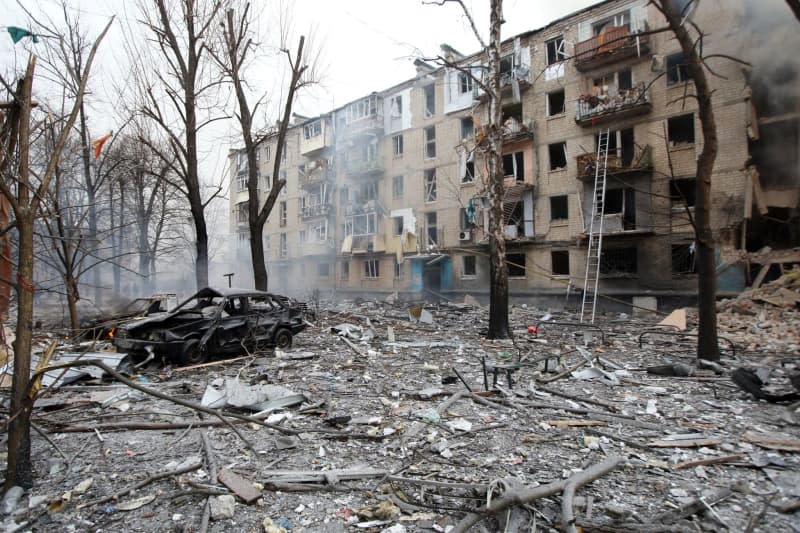More deaths after fresh Russian missile strikes on Ukraine

More people have been killed in Ukraine after Russia fired dozens more missiles across the country, with explosions reported from the capital Kiev to the eastern city of Kharkiv.
According to official figures, at least 10 people were killed across the country.
Eight deaths and more than 50 injuries were reported on Tuesday in Kharkiv alone. One woman also died in Pavlohrad in the Dnipropetrovsk region.
Two people died when a Russian fighter jet attacked a village in the Kherson region of southern Ukraine. More than 20 people were injured in the capital Kiev, officials said.
Several residential buildings were damaged, Vitali Klitschko, the mayor of Kiev, announced on Telegram. An unexploded rocket warhead was discovered in one flat. The entire house has now been evacuated.
Ukrainian Commander-in-Chief Valerii Zaluzhnyi said Russian military launched a total of 41 missiles of various types in the early morning attacks. Only around half were intercepted.
In Kiev, which is relatively well equipped with air defence systems thanks to Western support, all the missiles were shot down on approach, according to the military. In the early afternoon, another air alert was issued in several regions.
Ukraine has been fending off a full-scale Russian invasion for almost two years.
German Defence Minister Boris Pistorius has now promised Ukraine six Sea King Mk41 multi-purpose helicopters, accessories and spare parts as well as training, the Ministry of Defence announced in Berlin on Tuesday.
Prior to the announcement, Ukraine's supporters had met via video link in the so-called Ramstein format for advisory talks.
"The Sea King is a proven and robust helicopter that will help the Ukrainians in many areas: from reconnaissance over the Black Sea to transporting soldiers. It is the first German delivery of its kind," said Pistorius.
Military deliveries from Germany have totalled around €6 billion ($6.5 billion) since the start of the war, the ministry said.
Later on Tuesday, Ukrainian Foreign Minister Dmytro Kuleba criticized the ramp-up of arms production in the West as being too slow.
"We appreciate everything we receive, but the scale of the war demands more," he said in an interview in Kiev with Bild, Welt TV and Politico, which are all owned by the Axel Springer company.
Ukraine is producing more, but the Western defence industry cannot supply enough artillery ammunition. The lack of ammunition is costing the lives of many Ukrainian soldiers, he said.
Officers and soldiers repeatedly told him that Russia was clearly superior in the supply of artillery ammunition, said Kuleba. One reason is supplies from North Korea.
"As ridiculous as it may sound, it seems that North Korea is a more efficient partner for Russia than its friends who are trying to supply Ukraine with artillery ammunition."
Also in Kiev Ukrainian President Volodymyr Zelensky and the leader of the European People's Party (EPP), Manfred Weber, called on Tuesday for the release of €50 billion ($54 billion) in EU funds, saying the money is vital for Ukraine to defend itself against Russia.
Zelensky, at a meeting with the conservative German politician, said his country is counting on the release of the multi-year financial aid at a special meeting of the European Council on February 1.
The decision on multi-year EU financial aid for Ukraine has been blocked since last December.
"There is no option of failure next week," said Weber, chairman of the Christian Democrat group in the European Parliament, who is also a leading figure in the German conservative party the Christian Social Union (CSU) in Bavaria.
"This is money well spent by European taxpayers to stabilize Ukraine," Weber said.
Weber also said the EU must deliver, as promised, 1 million 155-millimetre NATO-calibre artillery shells by the spring.
Strengthening air defence, especially for the Odessa region in southern Ukraine, is also necessary.
NATO has concluded framework contracts with companies from Germany and France for the supply of artillery ammunition worth around €1.1 billion ($1.19 billion)). The 155-millimetre shells are to be used in CAESAR and PZH-2000 howitzer weapon systems, according to the NATO Support and Procurement Agency (NSPA). Both are also used by Ukraine in its defensive war against Russia.
The companies that have been awarded the contracts are reportedly the French company Nexter Munitions (KNDS) and the German company Junghans Microtec.
The German firm manufactures fuses for artillery ammunition in Dunningen in the south-western state of Baden-Württemberg. According to information from NATO sources, the agreement should enable the procurement of more than 220,000 shells.
Weber has accused the German government of a lack of determination and speed in its support for Ukraine.
This is currently the case with the delivery of Taurus cruise missiles. The decision in favour of a delivery of this weapon system is "overdue," said Weber.
As recently as January 17, a parliamentary motion to send long-range Taurus cruise missiles to Ukraine was rejected by a large majority of lawmakers.
The German government fears that Russian territory could also be hit due to the Taurus missile range of 500 kilometres.



